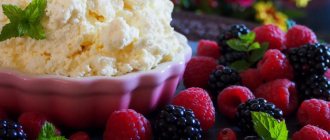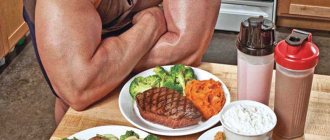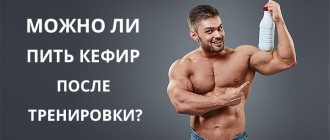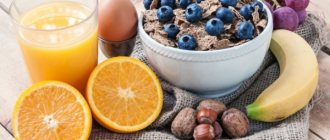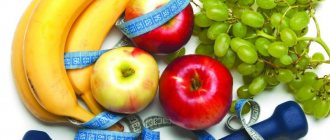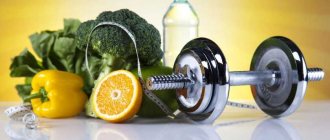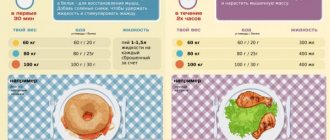And a little about secrets...
The story of one of our readers, Irina Volodina:
I was especially distressed by my eyes, which were surrounded by large wrinkles, plus dark circles and puffiness. How to completely remove wrinkles and bags under the eyes? How to deal with swelling and redness? But nothing ages or rejuvenates a person more than his eyes.
But how to rejuvenate them? Plastic surgery? I found out - no less than 5 thousand dollars. Hardware procedures - photorejuvenation, gas-liquid peeling, radio lifting, laser facelift? A little more affordable - the course costs 1.5-2 thousand dollars. And when will you find time for all this? And it's still expensive. Especially now. Therefore, I chose a different method for myself...
Answers to frequently asked questions about pre- and post-workout nutrition
Before we wrap up, I want to answer a few questions that many people have after reading this article.
Can you tell us more about whey protein? What brand of protein and dextrose do you recommend?
For complete information on protein (and protein supplements in general), see below in this guide.
As for recommendations, I personally use and recommend to others Optimum Nutrition's 100% Whey.
When it comes to dextrose, any brand will do. It's pretty cheap, so buy in bulk if you decide to use it as a post-workout carbohydrate source. I personally prefer Now Foods Dextrose.
My goal is to lose weight. Could the EXTRA calories in my pre- and post-workout meals be causing me extra weight and preventing me from losing those extra pounds?
No way. Because these calories ARE NOT EXTRA.
They are part of your overall daily diet.
What I mean is that the extra calories from these meals will ONLY become harmful if you consume them in excess of the calories you should be consuming.
They should be just a PART of your total daily caloric intake that is ideal for you.
That is, if you need to consume 2,500 calories per day (for example), then the calories in your pre- and post-workout meals should be part of those 2,500 calories, NOT in addition to them.
This seems obvious, but I was often asked a surprised question: “Do I need to count these calories too?!”
The same goes for proteins, carbohydrates and/or fats. The calories and nutrients in these meals also count toward your total daily calorie intake.
If I do cardio after strength training, what time should I eat after my workout?
You can either eat immediately after you've completed your entire workout (in this case, after cardio), or if you drink a shake after your workout (option A), you can use the other 3 options.
You can also take a short break between strength training and cardio and drink your post-workout shake.
Or just drink it while doing cardio.
You can also combine options. Start drinking before cardio and finish during it. If you prefer, you can start drinking a shake at the end of your strength training session.
In fact, if you consume a certain amount of protein and carbohydrates shortly after your workout, then you are doing everything right.
Some companies make pre- and post-workout sports drinks that contain the same ingredients you mentioned. Can I use them?
You can, but it's better not to.
First of all, you won't waste your money because it's much cheaper to buy protein and dextrose and add water to make this drink yourself.
In addition, you can choose the amount of substances that is optimal for you (and not what the manufacturing company decided to include), and also not overpay for those useless ingredients that such drinks often include.
So I would recommend either consuming solid food or making your own shake using your own ingredients.
What's next?
This is everything you need to know about what, when, why and how to eat before and after workouts.
Now it's time to talk about what everyone likes to spend a lot of time and money on. I mean sports supplements.
www.acaloriecounter.com/diet/pre-and-post-workout-meal/
Don't run alone
Although running is a great workout, it has been proven that without combining it with strength training, running alone will not help you effectively lose weight.
A weight loss training program should include both aerobic and strength training. For aerobic exercise, running is an excellent choice. Supplement your weekly training with at least 2 sessions of strength training with weights and in addition to losing weight, you will gain a sculpted, toned body.
When you strengthen your muscles, build up even small muscle mass, the effect of running increases several times.
Why it's good to strengthen your muscles with exercise in addition to running:
— Toned, strong muscles burn more calories while running, all other things being equal;
— The risk of injury is reduced, strong muscles better protect the spine and joints;
- Muscles help your body gain athletic definition, in addition to helping you lose excess fat from running.
Proteins, fats and carbohydrates: their role in an athlete’s nutrition
Any food product contains greater or lesser amounts of any of the three vital nutrients. These are proteins, fats and carbohydrates. Each of these components plays a specific role in the body:
- After digestion, protein breaks down into amino acids. It is a building material for cells throughout the human body. Muscles, organ tissues, blood vessels - all this is built from amino acids. Proteins in the diet affect digestion, respiration, and blood clotting. They are also responsible more than other nutrients for muscle contractions and nerve conduction. A deficiency of amino acids and protein leads to muscular dystrophy, weakness, low performance, and increased excitability. Eating after an evening workout requires the presence of protein - this is necessary in order to saturate the muscles with amino acids and prevent the process of catabolism (muscle breakdown) from starting at night.
- Fats are a source of energy. With an excess of this nutrient, excess weight begins to accumulate. The layer of subcutaneous fat increases. As a result, the person is diagnosed with obesity. You cannot completely give up fats, but you should strictly regulate their amount in the diet. Foods containing fats are indispensable during heavy physical activity and in cold weather. The quality of the fat also matters. For example, unsaturated fatty acids are essential and enter our body only with food, mainly vegetable oils. You should opt for cold-pressed unrefined olive, flaxseed, sunflower, cottonseed, sesame oil.
- Carbohydrates are the main element that supplies the human body with energy. Carbohydrates can be simple - glucose, fructose, galactose; as well as sucrose and lactose. They are absorbed instantly, contribute to a jump in insulin, which is why a person begins to feel hungry and eats more than necessary. As a result, the layer of subcutaneous fat increases and excess weight accumulates. Complex carbohydrates are not so dangerous in terms of obesity - they are starch, fiber, glycogen. Carbohydrates must be present in moderate amounts in an athlete’s diet for normal muscle growth. Complex carbohydrates are also an excellent source of energy. With their deficiency, a person becomes lethargic, incapacitated, and depressed.
The benefits of running for the body
Wanting to get in shape and “lose the fat,” we buy new running shoes and vow to start a new athletic running life, and then everything will change. And indeed, a lot would change, because it’s not for nothing that running has gained enormous popularity over so many years.
What would happen if you started jogging regularly:
— Active regular work of the muscles of the whole body, their strengthening;
— Beneficial load on joints with proper organization of running and rest;
— Increased metabolic rate;
— Burning more energy obtained from food;
— More active saturation of blood with oxygen and, as a result, good health;
— Increasing immunity, training the heart and blood vessels.
Running does not require additional equipment or complex skills. Maximum, buying comfortable clothes according to the weather and three to four hours of free time a week.
Protein is the boss of everything
Protein is an element that enters the body, is broken down into amino acids and nourishes muscle fibers. In fact, protein is a building material for muscles, without which the effectiveness of exercise is close to zero. This is why your post-workout meal should include a high-protein meal or protein shake. In this case, the second option is preferable. It is also worth considering taking BCAA along with a carbohydrate drink. The option already discussed above - a gainer - is useful here too, since it contains both protein and carbohydrates.
Timely intake of protein increases the rate of production of new muscle cells by 2-3 times. In addition, it is a reliable assistant in increasing insulin secretion and accelerating recovery processes. A sufficient portion after class is 25-30 grams.
The best sources of the component (from regular food) are poultry, lean fish, eggs (boiled or made into an omelet).
Nutrition before running
Regardless of whether you plan to run in the morning or in the evening, experts do not recommend running on an empty stomach. During fasting, glucose levels decrease, and the body begins to burn muscle tissue rather than fat. In order not to feel weak and increase endurance, it is important to eat 1.5-2 hours before class. Food should contain sufficient amounts of proteins and carbohydrates.
Professional runner level
If jogging is done regularly throughout the year, and there is motivation for sporting achievements, the training can be called professional. In this case, proper morning preparation for jogging is important.
Meals should include:
- A full serving of proteins: an omelet, boiled eggs, a sandwich with turkey or white lean fish, yogurt or sugar-free cottage cheese.
- Complex carbohydrates in the ratio to proteins are approximately 1/3. Vegetables, dried fruits, muesli, bananas, apples or rice are suitable.
- Protein drink or fruit and milkshake. They will help avoid dehydration and add substances necessary for building muscle mass.
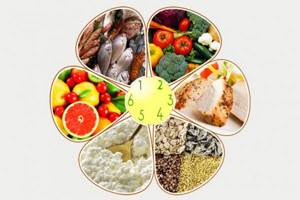
Recommendations for Beginners
For those who are just starting to run, it is important to provide the body with additional energy and stimulate the production of dopamine. This will help you stay motivated and continue studying.
Foods you can eat before training:
- almonds, avocados or bananas;
- fruit and berry smoothies with yogurt and nuts;
- vitamin and mineral complex with ginseng.
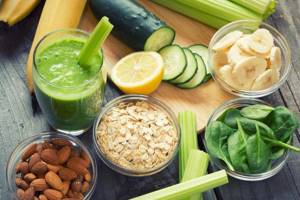
Foods enriched with carbohydrates
When running to lose weight, you should pay attention to the amount of calories in food, taking into account your age. The amount of food containing carbohydrates should not exceed 200-300 g (the older a person is, the less carbohydrates his body requires). In this case, preference is given to complex carbohydrates.
Breakfast can be supplemented with:
- a slice of whole grain bread with peanut butter;
- durum wheat pasta;
- bagel with honey;
- fruit salad of bananas, oranges and nuts.
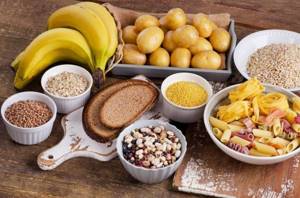
Diet restrictions
It is better not to eat fatty foods high in calories before jogging. It will not give the desired effect, and may cause digestive problems, nausea or fluid retention. Proper nutrition when running for weight loss also involves limiting the consumption of salty and sweet foods.
Also prohibited:
- fast food;
- smoked and fried meat, fish, chicken;
- sausages;
- mushroom dishes;
- sauces, mayonnaise;
- chips, crackers, foods high in salt;
- baked goods, sweets, chocolate;
- carbonated drinks.
To avoid overloading your kidneys and heart, you should not drink a lot of liquid before jogging. After breakfast, drink sweet tea or a glass of fruit juice (no more than 200 ml).

Sports nutrition for running for weight loss
You can find sports nutrition in specialized stores and fitness clubs. It is not only suitable for professional athletes. Such food is not a complete replacement for natural products, but it allows you to supplement your diet with elements that increase strength and promote muscle growth.
The benefits of sports nutrition include:
- rapid absorption by the body and high efficiency;
- the ability to adjust the diet taking into account age and level of training;
- positive effects on metabolism and hydration;
- strengthening joints, increasing immunity.
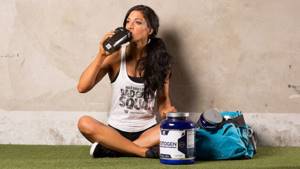
What to do before training
It's important to understand when you're training, how much time you have beforehand, and how intense it will be. These factors vary from person to person depending on body type and metabolism
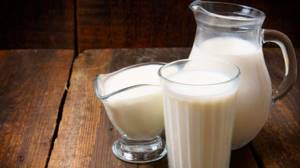
This refers to the last meal you eat before your workout. If for some reason you cannot train on an empty stomach (for example, many people feel dizzy), it doesn’t matter: 30-40 minutes before training, eat something light but carbohydrate-rich (coffee with a banana, tea with bread) .
What is it aimed at:
- reduce glycogen depletion in your muscles
- reduce protein breakdown and
- reduce cortisol levels in the body after exercise
For this to happen, you need to make sure you have a balance of carbohydrates and protein. It's simple. It's best not to worry too much about how many grams you consume and how many minutes before your workout. If you do not train on an empty stomach, but during the day, then an hour and a half before training, I recommend eating a heavy meal of complex carbohydrates (pasta, oatmeal, rice): they will give you energy for a long time. If you didn’t manage to eat properly before training and you feel that your strength is “zero”, and you don’t want to train at all, then half an hour before training, throw some quick “coals” into yourself: a banana with coffee, dried fruits. Fast carbohydrates are fast because they give a quick surge of strength and energy for an intense workout. You will be able to conduct quality classes and get to the “second wind”, which will definitely open up.
(Eating protein improves the body's ability to build muscle)
If you have an hour/hour and a half before training, ideally you should eat a certain amount of protein, carbohydrates and some fat. Control the amount of food you eat. Fats should be kept in the minority as they can cause discomfort and can lead to heartburn during exercise. If you work out in the morning, drink a smoothie or something light just to fuel yourself. Any workout that lasts an hour or two is stressful for the body.
Personally, I drink a glass of milk in the morning, eat some almonds and a banana or apple. If I feel lazy in the morning, espresso helps me. The fact is that caffeine is known to act as an artificial stimulant that helps mobilize the release of fat cells into the bloodstream, and this increases your ability to perform an intense workout.
Carbohydrates after training - harm or benefit?
As mentioned above, carbohydrates are different from carbohydrates. Here is a list of products that can be used to make a post-workout shake:
- berries: strawberries, blueberries, currants (no more than one hundred grams);
- banana - no more than 1 piece;
- nectarine or peach - no more than one piece;
- apples - no more than two pieces;
- kiwi - up to 200 grams.
It is also acceptable to eat citrus fruits - oranges, tangerines, grapefruits. Pineapples - depending on individual preferences. All these fruits and berries can be juiced and added to sports cocktails. You can simply eat the fruits raw or baked. For example, an apple can be cut into two parts, sprinkled with cinnamon and baked in the oven - you will get a fragrant and tasty dessert before bed that will not harm your figure.
The following carbohydrates should not be consumed after an evening workout:
- any products made from white flour;
- sugar and dishes containing it;
- factory-made sweets - chocolate, marshmallows, marshmallows, ice cream, etc.;
- packaged factory juices;
- sweet carbonated drinks;
- any drinks containing alcohol.
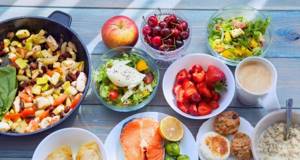
What can you eat immediately after training?
- Protein after training. Immediately after a workout, you need to load up on proteins, so to speak, to build and restore muscles, it’s good if it’s a protein drink. This way, your body synthesizes proteins in your muscles much faster. The amount of protein in the shake should be about 0.55 g per kilogram of ideal weight. If for some reason a smoothie is not ideal for you, use egg whites to prepare various dishes, such as omelettes. An individual dose of protein from food can be determined by the size of your palm, that is, the protein dish should visually fit in your palm.
- Carbohydrates after training. Carbohydrates after an active workout, as well as proteins, are best consumed in liquid form. These can be simple high glycemic sources such as cranberry and grape juices, which have a high glucose to fructose ratio. This will help achieve a sharp jump in insulin levels in the blood, which, due to the anabolic and anti-catabolic properties of insulin itself, will allow you to build lean muscle tissue. With juice, the body should receive approximately 1 g of carbohydrates per 1 kg of ideal weight. To give you some guidance, one glass of grape juice contains 38 g of carbohydrates, and one glass of cranberry juice contains 31 g. If you don’t have juice on hand, you can eat absolutely any carbohydrate food, even your favorite jam with sugar, and you can, don’t be afraid that everything you eat will go straight to your thighs. On the contrary, all carbohydrates, like proteins, will be used for muscle restoration. However, there is one BUT, all carbohydrate products should not contain fat.
- Post-workout fats. Avoid consuming fats after training, otherwise fat will significantly slow down the flow of proteins and carbohydrates from the stomach into the blood, which in turn will slow down the process of recovery and muscle building, which will ultimately reduce the effectiveness of the workout.
List of allowed foods after training if you want to lose weight
What you need to eat after training to lose weight is indicated in the following table:
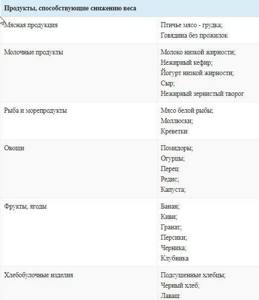
According to nutritionists, eggs are allowed for weight loss. You can boil them, prepare protein omelettes with vegetables. Among sweets, marshmallows, marmalade, and jam are allowed in small quantities.
Meat, fish and vegetables should be boiled or steamed rather than fried. It is recommended to season vegetable salads with olive oil.
What can you eat after training to lose weight?
Regardless of whether you train during the day or in the evening, there is a rule that is recommended to follow in your diet if you are on the path to losing “precious” fat. But there is a difference in what type of physical activity you use: aerobic or anaerobic.
During the first 30 minutes after strength training, the so-called protein-carbohydrate window occurs; it is during this period of time that food or sports nutrition does not go into fat, but to quickly restore the resources that were spent before.
It is important for us that the body draws energy not from the food we give it, but from its own fat reserves
When you are losing weight, try to close the carbohydrate window (energy inflammation) with a fruit with a low glycemic index, this could be an apple, kiwi, pear, etc. And to prevent your body from burning your muscles instead of fat, you need to consume “fast” protein. The optimal portion here would be BCAA, about 10 grams (individually) or whey protein, or at worst egg white. Speed of assimilation comes first here.
If you have a cardio workout ahead of you (running, swimming or cycling), then you need to take an intermediate break between eating and training. Its duration should be approximately 2 hours. This time interval must be maintained so that your own substrate during physical exercise. the maximum load was adipose tissue. But don't go hungry for too long or eat nothing at all all day. It often happens that when a person comes home, he or she eats a full meal before going to bed for the whole day, which is absolutely not allowed. It is not recommended to eat regular food immediately after cardio, and it is better to use isotonic water instead of standard water.
Forbidden food for runners
Pay attention to the list of foods that are extremely undesirable for runners:
- alcohol;
- deep-fried foods;
- fatty desserts;
- sauces and gravies;
- semi-finished products and fast food;
- soda;
- salty quick “snacks” like chips.
Be sure to remember that the distribution of nutrition during running training is not only the key to a successful workout, but also maximum benefit for the body. Remember that training with poor nutrition can harm your body.
Train correctly and go to the start line with the Almaty Marathon!
Express Your Reaction
Similar articles:
Nutritionist: “We must change public consciousness in the field of nutrition”
How many times have each of us heard the phrase: “We are what we eat”? This seems to be a well-known truth, but...
Doctors recommend on the eve of the Almaty Marathon
There are less than 10 days left until the Almaty Marathon - already on April 21, 17 thousand athletes will line up at the start...
“Happy” habits – it’s time to change your life for the better
Poor health, constant fatigue, lack of inspiration and ideas, the once beloved job has become tiresome...
He died before reaching the finish line...
On October 15, a sporting event took place in our city - the Almaty Half Marathon, which, to…
Everything you need to know about food allergies
Food allergies We all love to eat. Winter holidays are a special occasion to do this…
10 books about running
Many of us love running. For some it brings health benefits, restores, for others it calms...
Pre-workout meal rules
To achieve good results from training, regardless of its purpose, you need to follow proper nutrition. Therefore, you cannot eat whatever you want before class.
At this time, it is important to provide the body with a quality source of energy and protein.
BJU ratio
One of the key points is the ratio of proteins, fats and carbohydrates in the pre-workout meal. As a general rule, it should be:
- 55–60% proteins;
- 25–30% carbohydrates;
- 10–15% fat.
This regimen is suitable for maintaining weight and even for losing weight. Indeed, in a diet, the body already experiences a lack of nutrients and carbohydrates. Therefore, those losing weight do not have enough energy to exercise.
During heavy strength training, it is worth increasing the proportion of carbohydrates in your pre-workout meal. This is necessary for the full functioning of the muscles, which use glycogen reserves as an energy source.
Calorie calculation
- for weight loss - 15–30% less than what will be spent on training;
- for gaining muscle mass - 15–30% more;
- to maintain weight - the same amount.
The table provides information on calorie expenditure per hour of various workouts.
That is, if a girl does circuit training, she will spend approximately 550 kcal per hour of training. Therefore, before training you will need to consume about 400 kcal. For example, it could be 100 g of buckwheat and 100 g of tuna.
Grocery list
Now you can decide on a specific list of foods that are recommended to eat before class. As already mentioned, your pre-workout diet should include protein, carbohydrates and a small amount of fat.
It is advisable to consume complex (slow) carbohydrates. They provide a boost of energy for a long time and are not stored as fat deposits. Slow carbohydrates are found in the following foods:
- buckwheat porridge;
- oatmeal;
- Brown rice;
- potato;
- durum pasta;
- bran and grains.
Protein can be obtained from:
- meat;
- fish;
- low-fat cottage cheese;
- legumes
If it is not possible to eat 1-1.5 hours before training, you should consume simple carbohydrates 20-30 minutes before. They are quickly absorbed and provide energy for exercise. For this purpose you can eat:
- sweet fruits (apple, banana, etc.);
- low fat yogurt;
- chocolate;
- bars, candies;
- jam, jam.
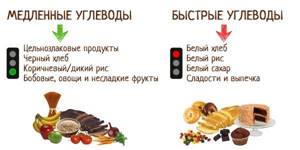
“Good” fats can be obtained from nuts, flaxseed or olive oils, avocado, trout, tuna, and fish oil. They are sources of vitamins, essential amino acids, help maintain skin elasticity, healthy hair, nails and are responsible for the normal functioning of the cardiovascular system.
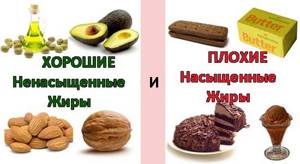
To improve digestion, it is worth supplementing your meals with foods rich in fiber. This will cleanse the gastrointestinal tract and stimulate its motility. Fiber is found in vegetables, lettuce, bran, cereals, and wheat.
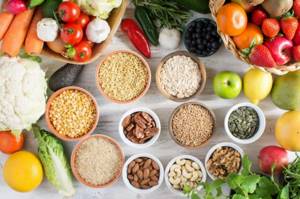
Fiber-rich foods
Sports nutrition
In addition, before training you can consume special sports nutrition.
During the drying period, you should drink a serving of whey protein or isolate 30–40 minutes before class. This supplement can be used as a snack when losing weight. BCAA's are also suitable - essential amino acids that should be taken immediately before training.
Ectomorphs - thin people who train to gain muscle mass and have difficulty gaining fat - can drink a mass gainer 30-40 minutes before performing weight-bearing exercises. But this will only be in addition to a full meal of solid food, which should take place earlier.
Evening jog
An evening jog is a great way to relieve stress from the day at work. However, do not forget about nutrition when running in the evenings, because if you are hungry and tired, it will be difficult for you to remember about training. Often you come back from a run with a noticeable feeling of hunger. And filling your stomach before bed can lead to insomnia.
To ensure that your evening workout brings not only benefits, but also pleasure, follow several nutritional rules:
- Maintain a healthy diet throughout the day to prevent stomach upset. You need to eat more often, but in small quantities, so that when you come home after running, you don’t feel very hungry.
- After running in the evening, you can eat only light food, which will restore lost energy and will not affect your sleep.
- Before running, you can eat yogurt, juice, fruit shakes, toast and nutritious porridge with nuts, skim milk and berries.
- Get used to the fact that lunch is the main time for eating. The main food should be what you can and should eat after a run: nutritious food from fish, beef, lamb, chicken fillet. You can also make your own cocktails from milk, drink low-fat yogurt with fruit, which is very useful for lunch.
- Don't forget to eat after lunch. A few hours before heading out to the track, enjoy some fruit or an energy bar along with a mug of water.
- When thinking about nutrition before a run, don't forget about fluids. Always drink one glass of water in the evening after running. You can also drink liquid while cooking, which will fill you up and prevent you from overeating.
- You need to have a light dinner. Most people think that if you eat after running in the evening, the extra calories will be converted into fat cells, but this is not true. Your body will use this energy to repair muscle tissue. However, if you overindulge in calories no matter the time of day, they will actually become fat.
Wonderful “carbohydrate window”: what to eat after training for muscle growth
In bodybuilding there is a concept - the post-workout carbohydrate window. This is a short period of time, from 15 to 40 minutes immediately after training. At this time, our body needs nutrients. During this period, our body is able to absorb a significant amount of nutrients. Primarily proteins and carbohydrates. Proteins are a building material for muscles, carbohydrates are a source of energy to replenish the energy spent during training and build new muscle fibers.
He says that guys who stopped consuming liquid sources of carbohydrates after exercise, replacing them with regular food. And then they completely shifted their food intake by an hour or two, and did not notice any deterioration in weight gain. And we even noticed an increase in strength and muscle mass.
The author of the blog himself refused to consume food during the carbohydrate-protein window and drank only water immediately after training. And then at home I ate rice with meat and vegetables an hour to an hour and a half after the end of the workout. This method, according to his observation, did not have a negative effect in terms of restoring glycogen in the muscles. This method of eating simplifies digestion because blood flows from the muscles to the stomach.
So, there is an opinion that the best option is to eat the right food within fifteen minutes, and up to half an hour after grueling work in the gym. This period is precisely called the amazing term “carbohydrate window”. The thing is that during intense exercise, the body draws energy from the conserved carbohydrate glycogen, which causes its deficiency, which must be replenished.
Thus, there is an ambivalent opinion about what you should eat immediately after training. Some talk about proteins that will help build new muscle fibers that were quite successfully destroyed during training. Others recommend consuming carbohydrates to make up for the lack of glycogen. However, the essence remains somewhere in the middle.
The thing is that it doesn’t matter at all whether you eat carbohydrates or proteins, all this goodness will definitely go towards restoring energy and it’s better if it’s a complex. The only thing you need to take into account is that the foods you absorb at this time should be extremely digestible, for example, a wonderful option would be a banana, a handful of grapes, a glass of milk with a bun, and so on.
If you are planning a long workout (more than an hour), it is advisable to stock up on sports drinks, which will contain from 30 to 60 g of carbohydrates, which will support the body and give energy. Don't worry, during training, carbohydrates in such quantities will not be able to settle on your thighs; they will be used by your body as additional fuel.
During training, you can also drink freshly squeezed fruit juices (prepared the day before the workout). The best option is freshly squeezed orange juice, diluted in equal proportions with water.
If you are exercising for the purpose of losing weight, try to limit yourself to fluids, but you should be very attentive to how you feel during exercise. If you feel an unbearable feeling of thirst, dry mouth, dizziness, headaches and nausea, immediately stop training and start drinking water in small sips every 3-5 minutes until the symptoms of dehydration cease.
Allowed foods and healthy dishes
The list of permitted foods for a balanced diet is quite wide and does not limit the athlete. The main rule is to maintain the ratio of BZHU and calorie content. When it comes to cooking, there are a few rules you need to follow:
- Consume only boiled, steamed and stewed foods;
- Replace white bread with rye bread, bran bread, or eat bread, as they contain a lot of fiber;
- Avoid smoked foods, avoid frying and baking in large amounts of oil or animal fat.

Dishes made from fresh vegetables will be healthier if they are seasoned with vegetable oil and seeds and nuts are added to them. Products that include vegetable fats allow vitamins A, E, D and K to be better absorbed. Try not to salt your food, use aromatic herbs and spices instead, which give dishes a pleasant aroma and improve their taste.
Carbohydrates Recommended Post-Workout
Carbohydrates are the main source of fast energy. Their amount per day should be about 300-600 g, depending on the intensity of sports activities. However, not all carbohydrates are healthy. They are divided into two types:
- Simple (quick) - refined sugar and all dishes containing it. These foods are not recommended for consumption, as they very quickly increase blood glucose levels, which also drop rapidly. Insulin surges lead to increased appetite and fatigue;
- Complex (slow) - vegetables and various cereals, beans. They can be eaten after training, but only for those who want to gain muscle mass. They take longer to digest and provide good energy, which is necessary for muscle growth.

When burning fat, foods with an abundance of complex carbohydrates are also not recommended, as they will block the processes of breakdown of fat cells. This rule only applies after sports activities! During the day, be sure to eat a variety of cereals and vegetables.
Which proteins are healthier after workouts?
Proteins are the main and only building material in the body, so they are indispensable in the diet. Their amount with average physical activity should be about 67-120 g per day. There are two types of proteins:
- Vegetables – legumes, nuts, seeds;
- Animals – meat, fish, seafood, low-fat dairy products, eggs.

They have the same benefits for the body, but animal proteins are absorbed faster and easier, so they are preferable to consume after workouts, even in the evening.
Top 5 vegetables and fruits
Vegetables and fruits are a rich source of fiber, carbohydrates and even fat. They contain many vitamins and minerals and are indispensable in creating a balanced menu. The ranking of the five most useful included:
- Avocado is a source of Omega-3 fatty acids;
- Bananas – have a high glycemic index, ideal for replenishing energy losses after sports;
- Oranges – contain a lot of vitamin C, which is an antioxidant;
- Apples are a source of iron, which affects blood quality and oxygen saturation. They also contain fiber and vitamins;
- Beetroot – contains proteins, a large amount of mineral salts, and fatty acids.

Greens in the form of salads, parsley, dill, cilantro also have a complex of useful minerals and vitamins for the body.


